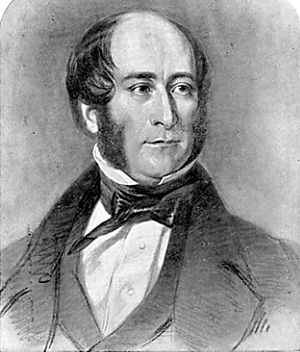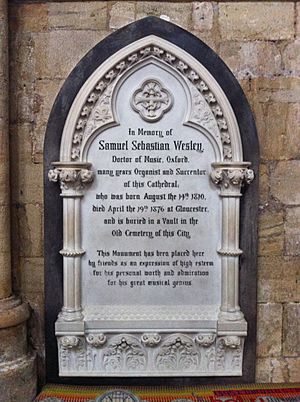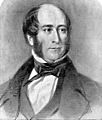Samuel Sebastian Wesley facts for kids
Samuel Sebastian Wesley was an English organist and composer. He was born in London on 14 August 1810 and died on 19 April 1876. Wesley was known as the most important English composer of church music during his time.
He lived when music standards in England were not very high. Wesley worked hard to make things better, especially for church music. He sometimes found it difficult to earn enough money. He also had disagreements with the people he worked for.
Contents
Life Story
Growing Up
Samuel Sebastian Wesley was the son of composer Samuel Wesley and Sarah Suter. He was named Samuel after his father and Sebastian after the famous composer Johann Sebastian Bach.
As a boy, he sang in the choir of the Chapel Royal. Life as a choirboy was strict. Samuel Sebastian was a very good choirboy. He and another boy were even sent to Brighton to sing for King George IV during his holiday. He also sang at St Paul's Cathedral.
His Career
Hereford Cathedral
When he was a young man, Wesley played the organ in several churches in London. He also started writing music, including some for plays in theatres. At 22, he became the organist at Hereford Cathedral. This job made him focus on church music.
He faced challenges at Hereford. The choir needed improvement, and the organ was broken. However, he performed at the Three Choirs Festival. He also wrote church music, like the popular anthem Blessed be the God and Father. He wrote this for an Easter Day service when the choir had only boys and one male singer. He married the sister of the cathedral's dean, though her family was not happy about it.
Exeter Cathedral
In 1835, Wesley moved to Exeter Cathedral. He helped improve the choir there and convinced the church to fix the organ. He earned a good salary, but he sometimes had disagreements with his employers. He loved fishing and would sometimes go fishing instead of working, sending a choir boy to play the organ.
One time, when he was supposed to play "God Save the King", he played "Rule Britannia" instead. This kind of behavior did not help his reputation. He wanted to get a doctorate degree from Oxford University. He wrote an anthem called O Lord thou art my God for this. The professor at Oxford wanted him to change some parts of the music, but Wesley refused. He still received the degree.
Leeds Parish Church
Wesley's next job was at Leeds Parish Church. This was the only job he had that was not at a cathedral. The choir in Leeds was likely better than any of his cathedral choirs. He improved the singing during church services.
Leeds was a busy industrial town back then, with a lot of pollution. Wesley earned extra money by giving music lessons. He was also asked to give organ recitals in different churches. He introduced more modern music to the choir, including his own songs. He wrote an introduction to a book of psalm tunes where he shared his thoughts on the state of the church in England. This made his employers upset.
One day, he went fishing when he should have been at choir practice. He fell while climbing over a stile and broke his leg. After that, he always walked with a limp. While recovering, he wrote an anthem called Cast me not away. When the music reaches the words “the bones which thou hast broken,” he used unusual, "crunching" chords.
Even with his sometimes difficult behavior, the people in Leeds were sad when he left. He conducted a performance of Handel's Messiah and was given a portrait of himself.
Winchester Cathedral
Wesley then went to Winchester Cathedral. At first, he got along well with the church leaders. He performed and wrote new music. He spent a lot of time gathering and publishing all the anthems he had written. He also composed hymn tunes. He convinced his employers to spend money on improving the organ.
Even though he was paid a good salary, Wesley started doing less work. He performed less often and let his students play a lot, so he could go fishing and sailing. He did not like the new precentor (a church official) who started in 1858.
In 1863, he wrote an anthem called Give the King thy Judgement for the marriage of the Prince of Wales (who would become King Edward VII) and Princess Alexandra of Denmark. He did not like Winchester, saying there were no other good musicians to talk to.
Gloucester Cathedral
When the organist job at Gloucester Cathedral became open, he took it and left Winchester quickly. Again, he found himself in a cathedral with a choir that needed work and an organ that was not in good condition. This time, he did not seem to try as hard to fix things. He spent a lot of time editing other people’s music.
After 30 years, he was able to perform in the Three Choirs Festival again. He conducted music by Louis Spohr, his father Samuel Wesley, and some music by the young Hubert Parry, who was not famous yet. When he conducted, he sometimes got confused. In 1871, he conducted Bach’s St Matthew Passion. This was the first time it had been performed in England outside London.
He was offered a knighthood but chose to receive money instead. He started to get sick with a kidney disease. The last time he played the organ was at Christmas in 1875. He died on 19th April 1876 and was buried next to his daughter in Devon. There was no music at his funeral.
His Music
Wesley is remembered for the music he wrote for the Church of England. He wrote many anthems, including Thou wilt keep him in perfect peace, Blessed be the God and Father, The Wilderness, and Ascribe unto the Lord. The last two are "verse anthems," which means they have parts for the full choir and parts for just a few solo singers. The popular short anthem Lead me Lord is part of a longer piece called Praise the Lord, O my soul.
He also wrote several pieces for the organ. One of his most charming works is Holsworthy Church Bells (1874). He also wrote music for small groups of instruments (chamber music) and for orchestras.
His Impact
Wesley had an important impact on how organs were built. He went to the Great Exhibition in 1851. There, he saw organs with pedals that spread out at the top like a fan, instead of being perfectly straight. He liked these "radiating pedal boards." He convinced the famous organ builder Henry Willis to put these kinds of pedal boards in the organs he built.
Samuel Sebastian Wesley was a very famous performer. Throughout his life, he was often asked to play the very first concerts on new organs. His music is still popular today. Some of his shorter anthems are not too hard for regular church choirs to sing.
Images for kids
 | Emma Amos |
 | Edward Mitchell Bannister |
 | Larry D. Alexander |
 | Ernie Barnes |





